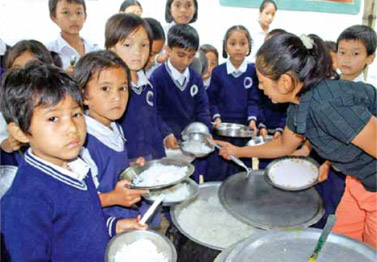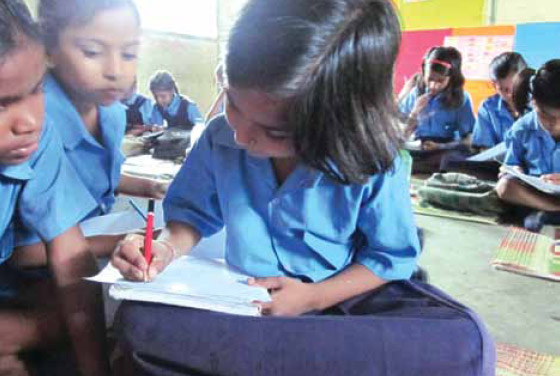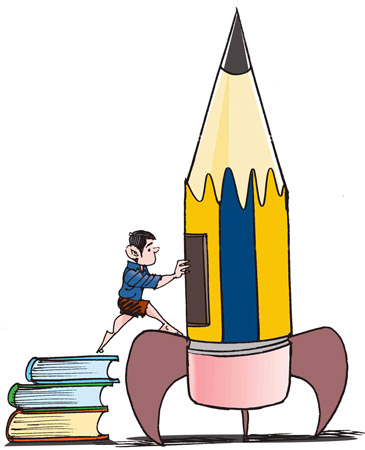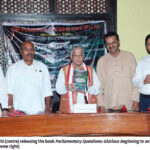Imust confess that this piece has been triggered by a newspaper report. Smriti Zubin Irani, our intrepid Minister for Human Resource Development, is picking the brains of thousands of Indians right down to the panchayat level, in order to formulate a New National Education Policy for the country.
Ergo, I thought, why not me too? Drafting a policy is a back-breaking task. So I am making do with some random thoughts and confining my suggestions to school education.
100% literacy
On literacy I have nothing original to suggest, except that if we can enforce the compulsory element of the Right to Education Act, it might do the trick. In my native Srinagar, Maharaja Hari Singh started what were known as “jabri skools” and it was a common sight to witness the spectacle of young children of Hanjis being led by the ears by hefty education department goons. Their loud wails rent our hearts, but also provided a bit of comedy in our lives.
If we start “jabri skools” all over and pay piece wages to unemployed youth @`100 for each child delivered single piece at the skool, we would have achieved the twin objectives of 100 per cent literacy and 100 per cent employment to rural youth.
Single-teacher schools
Many of our schools are single-teacher schools. If the teacher does not come, the school remains closed. If he comes, he has to teach all the children from Classes I to V simultaneously.
The solution I propose is rather simple. As we cannot afford five teachers for each primary school, give them at least one extra volunteer teacher. This chap would be given a pittance as honorarium and would be an unemployed youth from the same village. Also, let the primary schools report to the pradhan of the local gram panchayat. He would mark the attendance, make surprise checks and pay their salaries.
I tried this strategy in Himachal Pradesh. To my pleasant surprise, while I found the wayward regular staff punctually absent as before, the ill-paid temporary staff was always on time. The moral of the story probably is that efficiency is not a function of salary.
Singing the multiplication table
I have a grave charge against our teachers. In our days we used to sing the multiplication tables as if they were film songs when melody was queen. Nabira, a muscular youth, who had successfully failed in four attempts, would lead the chant and the whole class would follow, while the hard-worked teacher had a well-earned snooze. The song went something like this:
Do ikai do, do dooni char
Do tiya chhay, do chaukke aathh
Do panje dus, do chhay baran, and so on.
None of us from that generation has forgotten the table. My grandsons cannot do the simplest sums without using a calculator.
Today, even if we wish to introduce that tradition once again, we cannot. Firstly, where shall we get the brawny Nabira? He is a beneficiary of the no detention policy and has crossed the primary section long ago without damaging his cranial contents. The teacher suffers from insomnia and would need to take several sleeping tablets before he can induce sleep.
National Curricular Framework
The last National Curricular Framework was penned by the NCERT in 2005. It has got to be rewritten. Some of the changes suggested are the following:
- The role of the British colonial power may have to be reassessed in the light of the speech delivered by Shashi Tharoor at the Oxford Debating Society.
- Who should be called ‘Great’ in our history books may need a rethink. We might find that Alexander was not at all Great; he actually suffered a humiliating defeat by Porus the Great, which forced the Macedonian emperor to retrace his steps. We might decide that Akbar, the grandson of the Mongol invader Babar, did not deserve that honorific, while Maharana Pratap, who challenged the foreign invader, did.
- We may have to take into account the fresh evidence that seems to indicate that the Aryans did not invade India. In fact, that no people by the name of Aryans existed on the face of the earth.
- There is satellite imagery to prove that the Saraswati river existed in fact and was not a myth. Also, that the Palk Strait was the famed bridge of floating stones built by Lord Rama to invade Sri Lanka.
- The role played by various individuals and movements in our struggle for independence may need reassessment. It may turn out that the proponents of violence, like Bhagat Singh, Subhas Chandra Bose and the naval ratings, were a greater factor in our achievement of freedom than the so-called apostles of non-violence.
Common school system
At the school level, many experiments have been tried out but, to my mind, the greatest initiative was that of the Navodaya Vidyalaya. Rajiv Gandhi is reported to have said in the manner of an inspired leader, “Can we not have a Doon School in every district?” Today we have a Doon School in every district. It admits students from rural areas through an all-India examination, caters mostly to girls, members of SCs and STs and gives results comparable to the best public schools.
ALL we have to do is to convert every school to the Navodaya Vidyalaya pattern.
Some carping critic is bound to object that the cost would be prohibitive. But it would be well within our means if the Ambanis and Adanis, Azim Premji, the Bill Gates Foundation, and the rest of the jing-bang chip in with a few million dollars each. It would be the ultimate project of public-private participation.
This would form the basis of the common school system in which all government schools would become neighbourhood schools, to which all children living in the specified neighbourhood shall have a right to be admitted. If you don’t do this, how will you implement the Right to Education Act?
Take-off points
There have to be several take-off points in the school system. Students should be encouraged to take off into the workforce at Class VIII, Class X and Class XII stage, depending on their mental level, intellectual proclivity, employment potential and family background.
Nearly 99 per cent of students should be in vocations by the time they reach Class XII. They should not be ostracised as dropouts or be looked down upon as unfortunates who are not going to receive a college or university education.
Class XII should be the maximum general education status required for most of the jobs in the country. This formula should apply even to the top services like the all-India services, central services, and so on. Having caught the probationers young, they can be imparted a special course of one or two years as a part of their training programme.
THE idea is to divert 99 per cent of the population to skills. Now the interesting bit is that infusion of skills has been the primary objective of many schemes of the central and state governments. Examples are the vocational education stream, the Industrial Training Institutes, the Krishi Vigyan Kendras, the Training of Rural Youth for Self-Employment, the Jana Shikshan Nilayam, the community colleges, the National Skill Development Corporation, and so on and so forth.

It has now been realised that whether you refer to it as a vocation or a trade or a technical skill or training, what you are trying to infuse is a knowledge of a skill that is required in the marketplace. So let us call a spade a spade and divert the bulk of the manpower to acquisition of skills. It would be best if acquisition of a skill becomes the fundamental right of every citizen of the country. Making it a fundamental right does not make it compulsory; it only means that if someone wishes to acquire a skill, the government will be obligated to provide the necessary facilities.
That way, we shall not have unemployable graduates and unfulfilled demand for skilled manpower.
Value Education
India is a vast laboratory where there have been numerous experiments with value education. Some of the projects are the following:
- With examples of inspiring teachers, values can be easily imbibed if there is a conducive atmosphere.
- Basing the instruction on academic concepts of educational philosophy, first in an experimental school and then in a chain of schools. Examples are the philosophies of Gandhi, Swami Vivekananda, Sri Aurobindo, Bahaullah, Swami Dayanand, Jiddu Krishnamurti, the RSS, and so on.
- Through the National Centres for Value Education set up by MHRD in NCERT, NEUPA, IIT Delhi, IIM Lucknow and so on.
- Through training programmes for school principals, teachers, educational administrators run by organisations like Sathya Sai International Centre for Human Values, Ramakrishna Mission, Bahai World Faith, Navodaya Vidyalaya Sangathan, Delhi Public School and numerous others.
I suggest that the Ministry of Human Resource Development (MHRD) should own all these experiments and fund them where necessary. There should, however, be no attempt to lay down the syllabus of training programmes.
Many experimental schools confess to a feeling of frustration and disillusionment, when they find parents happily keeping their wards in such schools till Class VIII, but transferring them post-haste to the normal schools with CBSE or ICSE syllabus from Class IX onwards, so that they can compete in the admission tests to professional colleges.
This calls for the establishment of a third organisation, called the Central Board for Experimental Education, which would be on a par with, for all purposes, the CBSE/ICSE.
Organisational innovations
In the present dispensation, school education is totally dominated by IAS officers, with educationists being allowed at best to hold the posts of directors. The compulsions of the IAS being what they are, new subdivisions of the educational superstructure keep on getting formed.

Thus, there are separate secretaries looking after primary education, elementary education, secondary education, senior secondary education, adult education, literacy, non-formal education, and whatever other nomenclature the biradari can conceive of, thus fracturing into countless segments what ought to have been a seamless web of a single overarching policymaking mechanism.
IT is, therefore, suggested that there should be an all-India service called the Indian Education Service, manning all the top positions of the educational hierarchy, both at the Centre and in the states. While this will help in welding together the entire school education system into a single cohesive whole, it will also allow education to develop as an expertise, where the policymakers have had a lifetime of experience running the vast educational machinery extending right to the village level.
Involving the panchayats
When the Constitution was amended by the 73rd and 74th Amendments, the main objective was to create a third level of governance. It is widely known that teachers in government schools do not attend to their duties punctually. There is largescale absenteeism. Some states have the distinction of having two hierarchies of school teachers—the officially appointed ones and contract employees to whom the actual job of teaching is sublet for a consideration.
Even when they come to school, the teachers are least interested in teaching. Resultantly, independent agencies like the ASER Foundation and Pratham have castigated the entire government school system. Year after year they have found the literacy and numeracy skills of children in Class V to be hardly of the standard of class I or II. And by adopting the simple strategy of a ‘no detention policy’, the teaching community has been protected against any adverse administrative action.
States like Kerala and Karnataka, which have involved the panchayats in a big way, have found that the solution works.
In fact, some of the southern states are prime examples of success in literacy, mid-day meals, family planning, grassroots development, windmill energy and even communism.
Tailpiece
The practical experience of individual states has much to teach us. Girls’ education was a strict no-no for decades in states like Bihar. Nitish Kumar distributed cycles to girl students and created history. Narendra Modi has rightly placed building of lavatories for girls at the top of his Swachh Bharat Abhiyan agenda. The future will demonstrate the efficacy of this simple step.
If the central government avoids polysyllabic jargon and takes care of the bicycles and latrines, educational policy will take care of itself!
MK Kaw is a former Secretary, Government of India












































